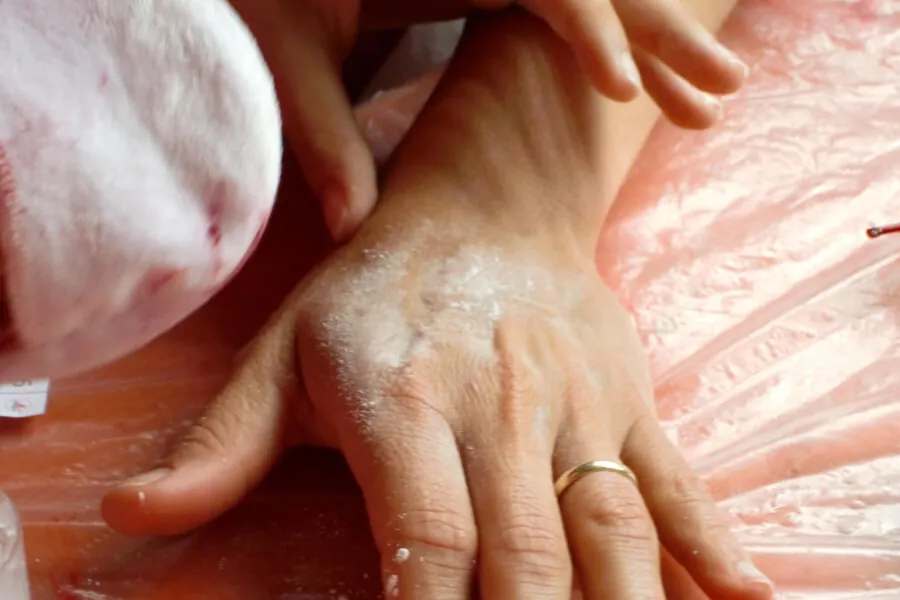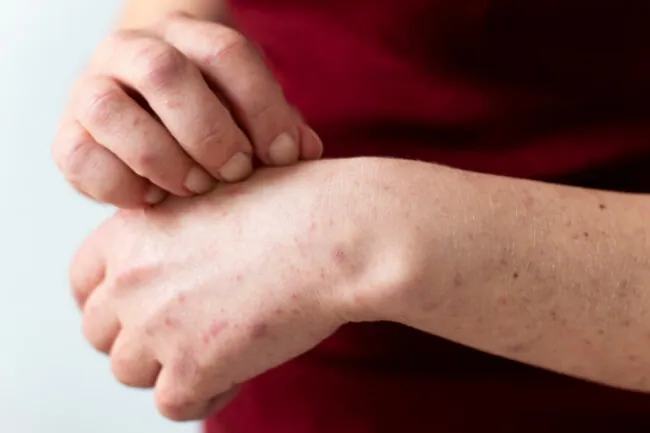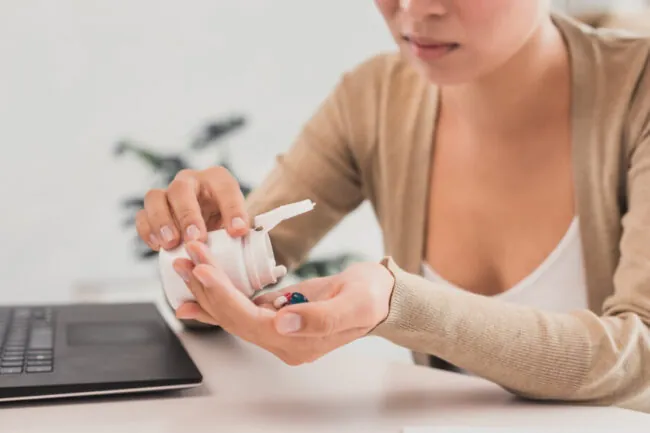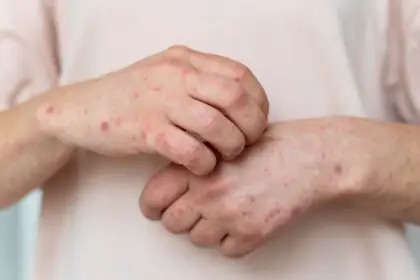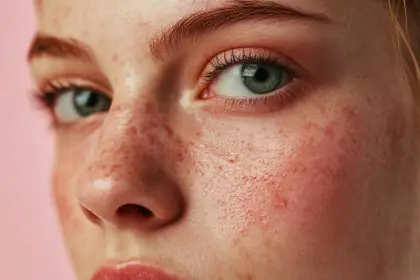How is Scabies Transmitted?
Transmission happens through direct skin-to-skin contact with an infected person.
While less common, it can also spread via infested clothing, bedding, or furniture.
Close, prolonged contact is typically necessary for transmission, making scabies prevalent in crowded living conditions such as nursing homes, dormitories, and prisons.
Myths vs. Facts for Scabies
Myth 1: Scabies Home Remedies are Ineffective Treatment
Fact: Scabies Home Remedies provide symptom relief, discover more about scabies home treatments, although it isn’t 100% sufficient but Medical treatments are often necessary to fully eliminate the infestation.
Myth 2: Scabies Only Affects Unhygienic Individuals
Fact: Scabies can affect anyone, regardless of their hygiene practices. The mites do not discriminate based on cleanliness, and outbreaks can occur in any population.
Myth 3: Scabies is Contagious Across Species
Fact: Scabies mites are species-specific. Human scabies mites do not infest pets, and vice versa. Pets have their own type of mites, which do not cross over to humans.
Myth 4: Over-The-Counter Products are Superior to Home Scabies Home Remedies
Fact: Over-the-counter products may help manage symptoms but are often less effective than prescription treatments. Combining these with Scabies Home Remedies can sometimes enhance relief but should not replace professional medical advice.
Uncovering the Facts About Scabies Home Remedies
Fact 1: Tea Tree Oil Can Help Alleviate Symptoms
Tea tree oil has antimicrobial properties that can reduce itching and inflammation associated with scabies. It should be diluted with a carrier oil before applying to the skin to prevent irritation.
Fact 2: Aloe Vera Provides Relief but Doesn’t Kill Mites
Aloe vera is known for its soothing properties, making it effective for reducing the itching and discomfort caused by scabies. However, it does not kill the mites, so it should be used alongside other treatments.
Fact 3: Neem Oil Can Aid in Managing Symptoms
Neem oil possesses anti-inflammatory and analgesic properties that can help manage the symptoms of scabies. Applying neem oil to affected areas can provide relief, but it should be used as part of a detailed treatment plan.
Fact 4: Proper Hygiene is Essential for your Health
Maintaining good hygiene is crucial overall for your own health. By managing and preventing scabies. Washing your bedding, clothing, and towels in hot water and drying them on high heat can help kill any mites. Regular cleaning of living spaces is also important.
Fact 5: Combining Your Scabies Home Remedies with Medical Treatments
Medical treatments like permethrin cream or oral ivermectin are typically necessary to completely eradicate scabies. Scabies Home Remedies can supplement these treatments by alleviating symptoms and speeding up recovery.
Supplementing Home Remedies with Medical Treatment
When to Consult a Doctor for Scabies Diagnosis?
If you suspect you have scabies, consult a healthcare professional for an accurate diagnosis and appropriate treatment plan. Persistent or severe symptoms warrant immediate medical attention.
Prescription Medications and Creams for Severe Cases
For severe cases, doctors may prescribe stronger medications such as oral ivermectin or topical permethrin cream. These treatments are highly effective in eliminating mites and eggs.
Preventative Measures Against Scabies
Personal Hygiene Practices to Avoid Scabies Infestation
Maintaining personal hygiene, avoiding sharing clothing or bedding, and limiting close physical contact with infested individuals can help prevent scabies infestations.
Cleaning and Disinfecting Living Spaces to Prevent Recurrence
Regularly cleaning and disinfecting living spaces, including vacuuming carpets and furniture, washing clothing, and using hot water and high heat for bedding can prevent recurrence and spread.
Additional Information on Scabies
Common Misconceptions About Scabies
Understanding and exposing common misconceptions about scabies can help in managing the condition effectively.
Complications of Untreated Scabies
If you’ve got scabies, it’s really important to get it treated as soon as you can. Untreated scabies can lead to other problems like bacterial infections, so it’s best to get it sorted as soon as you can.
Conclusion
Understanding the facts about scabies and its treatment options can empower individuals to manage and treat the condition effectively.
Combining Scabies Home Remedies with medical treatments, maintaining good hygiene, and taking preventive measures are important steps in dealing with scabies.
FAQs
What is scabies?
Scabies is a contagious skin condition caused by infestation with the Sarcoptes scabiei mite, resulting in intense itching and rash.
How is scabies treated?
Scabies is typically treated with prescription medications such as permethrin cream or oral ivermectin, alongside maintaining good hygiene and cleaning living spaces.
What is the truth about scabies?
Scabies can affect anyone and requires medical treatment for complete eradication. Scabies Home Remedies can help alleviate symptoms but are not sufficient on their own.
How do you get rid of scabies 100%?
To completely eliminate scabies, follow a treatment plan prescribed by a healthcare professional, which may include topical or oral medications, and maintain thorough hygiene practices to prevent reinfestation.

